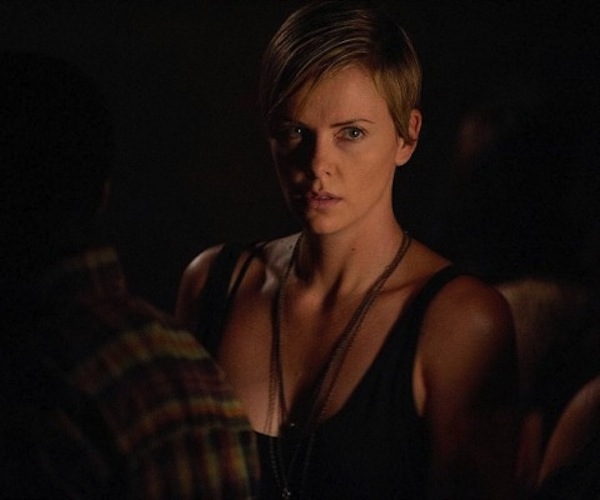Film Review: “Dark Places” — This is No “Gone Girl”
Dark Places fumbles and stumbles as it tries, but fails, to follow all of the possible solutions to the whodunit.
Dark Places, directed by Gilles Paquet-Brenner. At AMC Loews Boston Common and other cinemas around New England.

Charlize Theron in a scene from the suspense film “Dark Places.”
By Paul Dervis
Whatever happened to the young Charlize Theron, who could embody provocative characters on screen, such as Aileen Wuornos, the Daytona Beach hooker turned serial killer in the true-to-life story Monster? Or invigorate the complex figure of the abortion seeking Candy Kendall in The Cider House Rules? The actor even gave the distraught wife of Commander Armacost in The Astronaut’s Wife undeniable depth and texture. But lately she’s been satisfied to play in silly movies, like Seth MacFarlane’s A Million Ways to Die in the West and the action-pandering retread Mad Max: Fury Road.
And now there is Dark Places.
This film has been compared to last year’s critically acclaimed Gone Girl, partly because both movies are based on novels by Gillian Flynn. If it is a fair comparison, and I am not sure it is, then Dark Places does not measure up favourably.
In 1985 seven-year-old Libby Day was the only survivor of a Kansas home invasion that took the lives of her mother and two sisters. Her teen-aged brother, Ben, was not found in the house. Police suspected that the boy, a known devil worshipper, was the instigator of the murders. Libby, when grilled by the authorities, fingered Ben and now he has been in prison for 28 years.
Fast forward three decades. Libby is damaged and chain-smoking, living off an old insurance policy as well as the kindness of strangers. But her hard luck story has become very old news and she has run through the cash. Late on her rent payments and pushing forty, she needs money because she has never held a job.
Along comes a perverse organization called ‘The Kill Club,’ which is willing to give her upwards of a grand to relive the past. She wants no part of it at first, but she needs the loot so accepts the offer. But, surprise, there is more to this club than meets the eye. The group believes in her brother’s innocence, and needs her to help exonerate the guy.
And this is where the story goes from contrived to complicated….overly so, in fact. Dark Places fumbles and stumbles as it tries, but fails, to follow all of the possible solutions to the whodunit. If Ben didn’t do it, then who did? Maybe their absentee father? Well, he was a lousy drug dealer who was having a personal meltdown when the killings occurred. What about the Native-American leader of Ben’s cult? Maybe, but he has straightened out his life and comes up as an unlikely candidate.
But, wait a minute here. Ben is withholding info about some mystery woman named Polly or Molly or something. But would he really spend his life in prison to protect her? Doesn’t seem likely.
By the end of the film another, albeit absurd, answer pops up. In a hysterical effort to shake up the formulaic mystery yarn, Dark Places drags in a school of red herrings, few of which offer realistic options. The only resolution that does not seem to be explored is that Ben might, in fact, be guilty.
Director Gilles Paquet-Brenner (who also penned the screenplay) somehow keeps the suspense going and manages to hold the viewer’s interest despite falling down the plot’s rabbit holes of convolution. At times, however, Theron underplayed the lead to the point that her minimalism turned into going-through-the motions…and given her considerable talent, that’s a shame. On the positive side, half the film is told through flashbacks and the young actors, particularly Tye Sheridan as the angst-ridden young Ben, delivered refreshingly detailed and well developed characterizations.
But when all is said and done, the movie was just too self-consciously opaque to be satisfying. Anyhow you look at it, Dark Places is no Gone Girl.
Paul Dervis has been teaching drama in Canada at Algonquin College as well as the theatre conservatory Ottawa School of Speech & Drama for the past 15 years. Previously he ran theatre companies in Boston, New York, and Montreal. He has directed over 150 stage productions, receiving two dozen awards for his work. Paul has also directed six films, the most recent being 2011’s The Righteous Tithe.
Tagged: Dark Places, Gilles Paquet-Brenner, Gillian Flynn, Paul Dervis, charlize-theron

